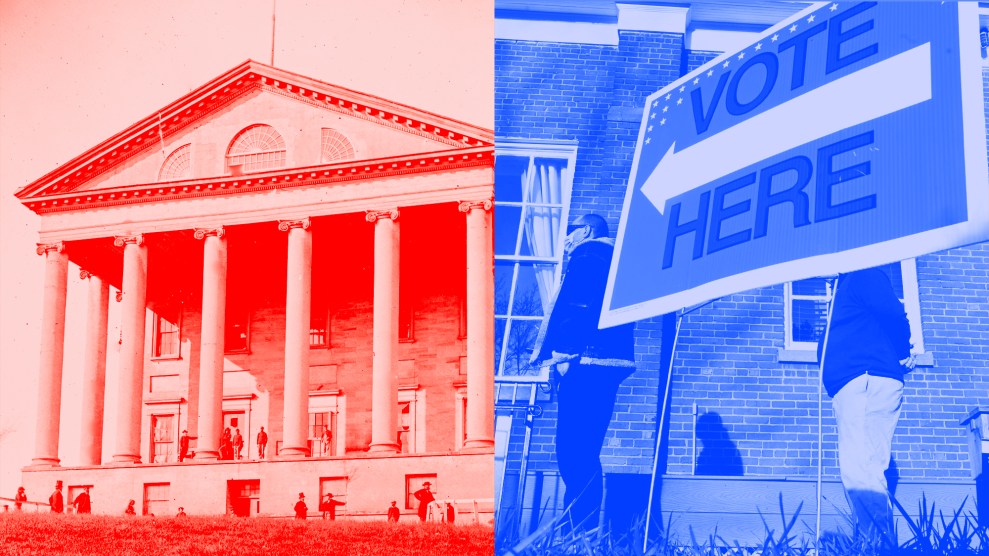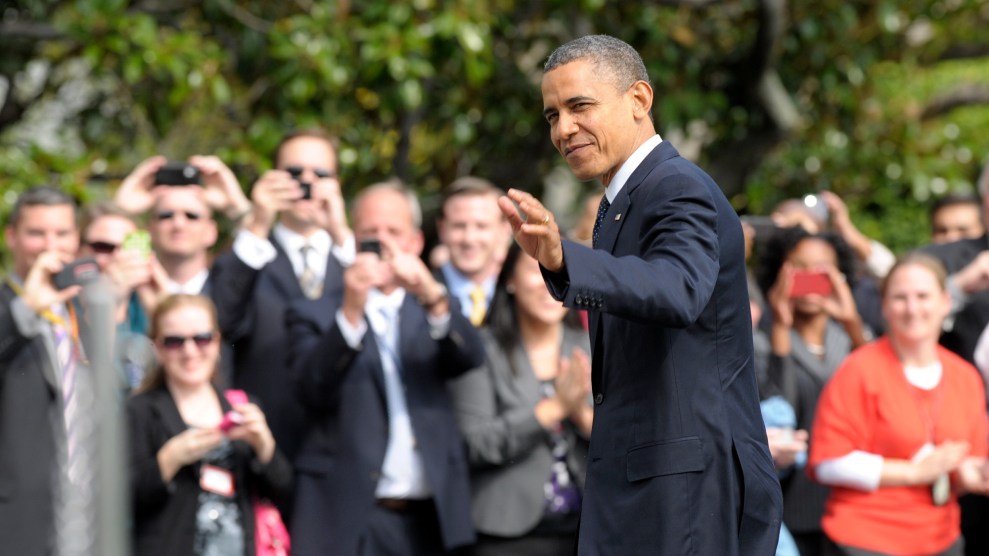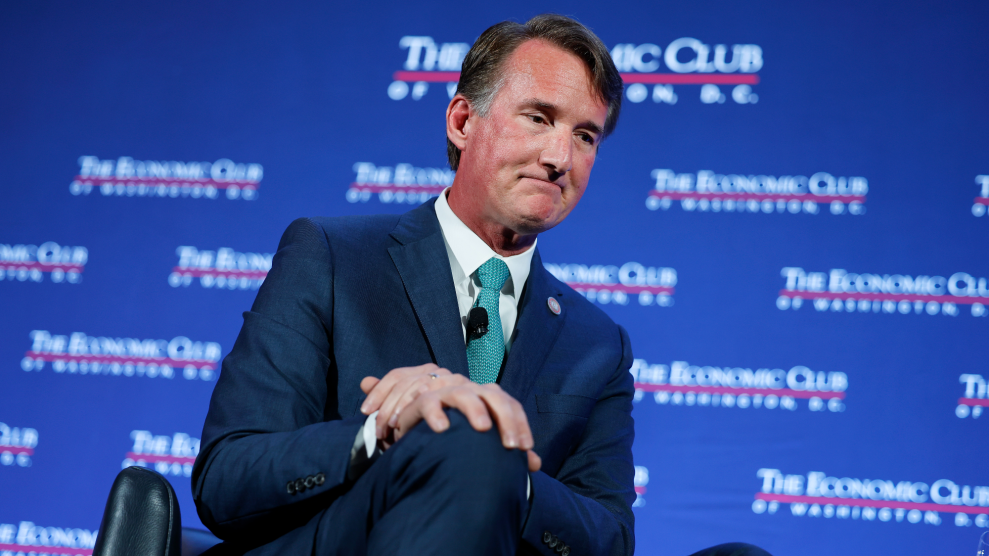
Mother Jones illustration; Buyenlarge/Getty; Andrew Caballero-Reynolds/AFP/Getty
“Are you a Republican or a Democrat?” asked a Stafford County, Virginia voter as she stood inside her screened-in porch Thursday evening.
“I’m firstly a person,” replied Leonard Lacey, the Democratic candidate running to represent District 64 in the Virginia House of Delegates.
It was the start of Lacey’s elevator pitch to voters, one he’s made hundreds, if not thousands, of times while canvassing as he heads into his Tuesday election against Republican Paul Milde. A former member of the Stafford County Board of Supervisors and the founder of an interior hardware company, Milde is running a hard-right campaign. He vows on his website to “stand up for innocent human life” and fight the “nonsense of the woke liberals” by stopping their “continued efforts to indoctrinate children attending our public schools.”
Lacey—a 70-year-old church pastor, a chaplain with the Stafford County Sheriff’s Office, and a three-decade Virginia State Police veteran—supports more liberal policies: reproductive health rights, modest gun control, and increased social services. Most of all, though, his message to voters is about unity over polarization. “We need to stop the gridlock, not just on I-95 but in everything that we do. What we do is we start at a place of contention and we walk away with nothing being done. So I’m going to stop that,” he told the voter.
Milde and Lacey are running in a newly drawn Stafford County district that “leans Republican,” according to the Virginia Public Access Project (VPAP), a nonpartisan government transparency group that tracks campaign finances and election results. But the surrounding Stafford County, an educated exurb 44 miles from Washington, D.C. with an average median family income of $119,000, has swung both ways in recent years. In 2020, Stafford voted for Joe Biden over Donald Trump by 3.27 points. The next year, Republican gubernatorial candidate Glenn Youngkin bested Democrat Terry McAuliffe in the county by nearly an 11-point margin. During the midterm elections in 2022, incumbent Democratic Congresswoman Abigail Spanberger lost Stafford by a mere 121 votes out of 57,491 cast.
All 140 Virginia General Assembly seats are on the ballot Tuesday, but it will be less than two dozen races in suburb-heavy, swing-voting areas like Stafford, Prince William, Richmond, and Virginia Beach that are expected to determine control of the General Assembly. If Virginia Republicans, who already control the governor’s mansion, pick up the state senate and hold their control of the statehouse, they will have a Republican trifecta—allowing them to pull the state rightward on issues like vehicle emissions standards and gun laws, and almost inevitably bring about abortion restrictions in the last Southern state without them.
Beyond Virginia’s borders, there are also ramifications coming out of Virginia’s suburbs. According to an analysis by the Brookings Institution think tank, it was purple-state suburban swing counties resembling Stafford and Fredericksburg that played an outsized role in delivering Biden his victory in 2020, meaning political prognosticators will certainly be watching their Virginia counterparts for 2024 tea leaves Tuesday night: the results from which will serve as a bellwether of the national political mood going into 2024.
Republican Governor Glenn Youngkin seems acutely aware of this fact. Often wearing a cherry red vest or navy blue polo, Youngkin has crisscrossed the state in a tour bus to get out the vote. He typically focuses his brief stump speeches on what Republican victories in the General Assembly would mean for Virginians: More support for police, for example, and greater parental control in education. Since his 2021 election, Youngkin established a tip-line for Virginia parents to report “divisive” practices in schools. He spearheaded a rule change allowing parents to select what pronouns their children will go by in the classroom. The so-called parents’ rights movement in Virginia was instrumental in Youngkin’s victory. On election night he even thanked them. “Way to go, mama bears!” he said. “You guys were awesome.”
But during one campaign stop in September, in a competitive district south of Richmond, Youngkin wanted Virginians to know their votes weren’t just about state concerns, they were also about the future of national politics. “Hold our House and flip our Senate,” he said. “Virginia is the test case.”
Experts agree. “The issues that candidates are focusing on look like they were delivered from national party headquarters that could be used just about anywhere in the United States,” says Mark Rozell, the founding dean of the Schar School of Policy and Government at George Mason University. “National political observers are looking carefully at what happens in Virginia this year for any evidence of how certain issues are playing with voters, particularly given the close competitiveness of the two parties in Virginia.”
Virginia’s odd-numbered legislative election years have long made the state prominent as political indicator of future presidential elections. In 2019, Democrats won both the statehouse and state senate; Biden went on to win the White House in 2020. In 2015, Virginia’s GOP retained both state chambers; Trump was elected President the following year.
Virginia is not necessarily a purple state, but it’s purple-ish. Serving as the gateway between a liberal Washington, D.C. and the American South, with relatively high proportions of both federal workers and rural populations, the state has elected approximately as many Republican Governors as Democratic ones in the last three decades. While Virginia at large has elected Democrats for President since 2008, recent polling on desired 2023 legislative elective outcomes show a near-tie: a mid-October Washington Post-George Mason Schar School poll found that 45 percent of likely voters leaned towards voting for Republicans in their district’s races, versus 47 percent who leaned towards electing the Democrats.
This year’s results may be even more indicative of the national attitude. In 2021, Virginia’s district maps were redrawn in a bipartisan redistricting process that prompted a wave of retirement announcements and diminished the name-recognition boost that incumbents generally enjoy. The result is that most of the highly competitive races will come down to candidates’ platforms and parties more so than their individual reputations. “This is really truly a measure of, ‘Is the Democratic message resonating or is the Republican message resonating?’” says Abhi Rahman, the communications director for the Democratic Legislative Campaign Committee, the party’s official arm for electing Democrats to statehouses.
The outcome of the parties’ respective messaging strategies on abortion will be especially telling, and is also expected to drum up voter turnout, which has historically been lower than in presidential and gubernatorial years. The recent Post-Schar poll found that 60 percent of registered voters in Virginia say abortion is a “very important” issue to them, up from 46 percent of voters who said so in 2019.
Since the Supreme Court overturned Roe v. Wade in 2022, all three states that have tried to pass ballot measures restricting abortion—Kansas, Kentucky, and Montana—have failed. Meanwhile, all three states that have voted on ballot measures to strengthen reproductive rights—California, Michigan, and Vermont—have succeeded. (Ohio is slated to vote on a ballot measure to protect abortion access on Tuesday.)
While Virginians will not vote on an abortion-related ballot measure like these other states have, the issue is at play in a different way. Governor Youngkin previously supported efforts to pass a bill to ban abortion beyond 15 weeks, with exceptions for rape and incest. Youngkin has made clear that he would try to pass a similar restriction in the new year if Republicans hold the statehouse and flip the state senate.
The proposed 15-week restriction, which his party has touted as “reasonable” and a “consensus” position in comparison to other Southern states six-week and complete bans, is thus a test-case of whether there is “a way for Republicans to position themselves in two-party competitive states on that issue so they’re not the scary ones to the voters,” says Rozell.
“Abortion is certainly on the ballot in Virginia” in the sense that a Republican trifecta in the state would culminate in reduced access, says Reproductive Freedom for All Vice President Ryan Stitzlein.
With the eyes of the country on the state, huge sums of money from both in and outside the state have been spent on these down-ballot races. The DLCC has put forth about $2.2 million. “Virginia is our number one priority,” DLCC’s Rahman says—and then repeats: “It is our number one priority.”
Youngkin’s Spirit of Virginia PAC has spent $7.7 million on legislative candidates in 2023, while the Republican State Leadership Committee, based in D.C., has spent roughly $3.4 million in Virginia, according to VPAP. The Democratic National Committee says it has contributed $1.5 million to Virginia legislative races this year—15 times what the group spent in the state in 2019. A non-profit group affiliated with Democratic Illinois Governor J.B. Pritzker funneled $250,000, and Clean Virginia Fund, a PAC devoted to fighting government corruption and promoting clean energy policy, has spent $9.7 million on Virginia legislative races between 2022-2023.
The vast majority of donations to Leonard Lacey’s $225,000 campaign war-chest came from small-dollar contributors giving $100 or less, though he also received $58,000 from the House Democratic Caucus and $20,000 from the Clean Virginia Fund, VPAP records show. Such money mostly went towards items like newspaper ads, bumper stickers, and campaign literature such as the leaflets he passed out Thursday night. He estimates his campaign has distributed about 18,000 of these leaflets since the start of his campaign.
It’s a meticulous ground game, one that he’s been working on since he decided to run for the House of Delegates in August 2022. Glued to the news as coverage of the Black Lives Matter movement and skepticism of election integrity continued to unfold, Lacey, a Black man, says he was inspired to run by Trump and others like him stoking political polarization through misinformation. Lacey thought running for local office would be the best, if imperfect, way for him to personally chip away at the divisiveness. “Part of it was local. But mainly, it was on the federal level, with the [former] President,” Lacey says.
History having illustrated the instructiveness of Virginia’s off-year elections, 2024 candidates like Trump would now be wise to take their own inspiration from the outcomes of Virginia races like Lacey’s.












